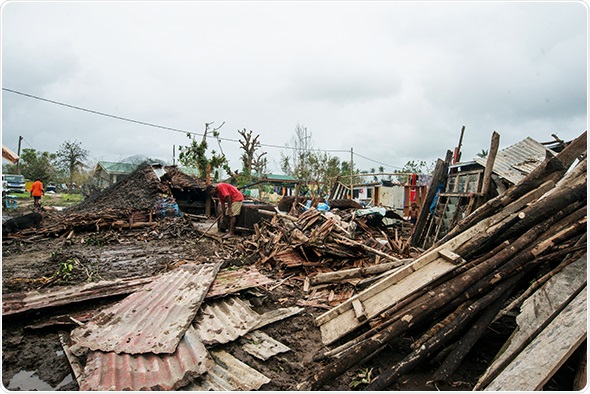With Tropical Cyclone Pam ripping through Vanuatu from late Friday night (13th March) into the early hours of Saturday morning, UNICEF Pacific reminds that 45% of the population is children and they are particularly vulnerable in any emergency.
“At this stage, before assessments are incomplete, we estimate that half the population (about 132,000 people) so that implies that around 60,000 children are affected,” said UNICEF Pacific Deputy Representative, Ms. Isabelle Austin. “We are mandated to protect and assist children and women affected by emergencies and therefore our concerns are particularly around their health, nutrition, safety, schooling and recovery.”
UNICEF is taking into account the damage to infrastructure and key services such as hospitals. According to the 2013 Demographic Health Survey, immunization coverage and nutritional status of children under five were suboptimal in this poor country. “After this catastrophe, maternal and child health care, including immunization and nutrition, will need to be prioritized in order to prevent deaths and debilitating illness”, Ms Austin said.
 UNICEF Pacific / Humans of Vanuatu
UNICEF Pacific / Humans of Vanuatu
One key area of UNICEF’s support is support to Government for coordination and implementation of the response in water and sanitation. “Safe drinking water and access to sanitation facilities are not available in many places, including insufficiencies at evacuation centres. This greatly increases the risk of water-borne and vector–borne diseases,” Ms Austin said. “Partners, including UNICEF are focusing on immediate needs in water, sanitation and hygiene, including the provision of water containers, purification tablets, soap, and temporary toilets or latrines.”
In terms of education, Ms Austin said: “It is expected that all early childhood centres, primary and secondary schools have been affected either with direct cyclone damage or because they are being used as evacuation centres. There is damage to buildings, water supply, loss of furniture and school supplies. Schools have been closed except as evacuation centres since the Cyclone hit and at least 70,000 school-aged children, from early childhood through secondary school, are losing out on schooling and also a sense of normalcy and safety. Obviously, their teachers are also negatively affected with home loss or damage and loss of food gardens.”
With Tuvalu, Solomon Islands and Vanuatu all declaring a state of emergency, UNICEF is working to provide assistance to the affected communities in these countries.
“UNICEF directly supports the Governments of these countries as well as coordinating with and working with development partners as members of the Pacific and Vanuatu Humanitarian Teams. Our main areas of support are logistics and supplies, coordination and implementation in water, sanitation and hygiene, nutrition, health, education and child protection,” Ms Austin concluded.
On the ground in Vanuatu
UNICEF has had an office in Vanuatu for decades, and their staff there are responding to the immediate needs of women and children, backed by strong support from Fiji and globally. The National Disaster Management Office is coordinating all humanitarian partners.
Communication Specialist Alice Clements is one of the staff who was in the capital, Port Vila, when the storm hit.
“It felt like the world was coming to an end,” she said. “The winds were incredibly strong, ripping off roofs, destroying homes and damaging hospitals and schools.” Today Ms Clements has been moving throughout Port Vila as far as possible given blocked roads, and talking to affected people. Ms Clements said: “Countless homes have been torn apart and communities left in ruins.”
A private pilot who flew over other islands has reported total devastation there as well – and with no support yet reaching them.
UNICEF’s response
In Vanuatu, we are supporting children and families in evacuation centres with a multidisciplinary team working on child protection, education, and health. We are working with the Government on water and sanitation, and have begun distributing supplies in affected areas.
Given low immunisation rates and a recent outbreak in early March, we are coordinating a measles prevention campaign with the World Health Organisation (WHO) and the Vanuatu Ministry of Health. We are restoring the vaccine cold store using emergency fuel stocks, so that life-saving immunization can be delivered to children.
We are working with other UN agencies and have put our local knowledge and expertise at their disposal, in order to help deliver the disaster response. We are providing the National Disaster Management Office (NDMO) with logistics support, airport handling and storage.
We are facilitating the shipment of WHO medical equipment as well as our own health and education from Fiji to Port Vila, Vanuatu. Staff in Fiji have also been working tirelessly to prepare this shipment.
Source:
UNICEF Pacific / Humans of Vanuatu